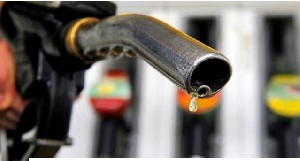The Institute for Energy Security (IES) has projected fuel prices are going to see an increase for price per litre between 1 and 2 percent in the first pricing window of April 2018 barring any intervention from government.
The Energy Think tank last month projected that fuel prices were going to remain the same throughout the month, and it happened.
The energy policy think tank, this time, believes the imminent increment of fuel prices is as a result of international indicators as well as slight depreciation of the local currency.
According to the statement published, Standard and Poor’s Global Platts, the benchmark for Gasoline and Gasoil, recorded price increases on the international fuel market. Gasoline closed trading at $645.77 per metric tonne from a previous average of $622.64, a change of 3.72%. Gasoil saw a price change of 2.82%, from a previous average of $571.61 per metric tonne to close at $587.73 per metric tonne.
The cedi’s depreciation within the period under review is also a factor which will see consumers paying more at the Pump in the first pricing window of April 2018.
In an interview with Mr. Richmond Rockson, the Principal Research Analyst at the IES, he said “If the National Petroleum Authority does not activate the Price Stabilisation and recovery levy to standardise prices consumers are likely to pay more in April for fuel products”
Following a 2% reduction of the Special Petroleum Tax by the government to 13%, coupled with some favourable international indicators, petroleum prices saw a decrease at the pump, with price stability lasting to the end of March.
BDCs accused of fuel price hikes
Controversial NPP Member of Parliament for Assin Central Honourable Kennedy last month accused the Bulk Distribution Companies (BDC’s) of using fuel prices hikes to make government unpopular, calling on the Energy Ministry to put them in check.
“I don’t see why NPP should allow the BDCs to dictate. I disagree with the minister. Minister is doing well, but I don't agree with him”, he said in an interview MYNEWSGH.com reported on earlier.
“You don’t allow BDCs to dictate. When you give them such powers, they will collapse NPP party because there will be no control”, he emphasized.
He called on the Minister and the members of the NPP government in charge of the sector to create competition for the BDCs. He said the fate of Ghanaians should not be left in the hands of the BDCs and their assigns.
“… They will decide the fate of Ghanaians, any price they want… You need your government cushioned so you give them strong competition…. they dictate… Minister, you have done well on electricity reduction, I walk chest out because of you, but on this one, please!”, he charged.
BOST staff blames ‘cartel
The Junior and the Senior Staff unions of state-owned Bulk Oil Storage and Transportation Company Limited (BOST), days ago called on the government to move against what they describe as a “cartel” sabotaging fuel prices.
In a statement, the executives of the two unions stated that BOST is the only institution with the adequate infrastructure and the human resource capacity to bring petroleum prices down but was being sabotaged.
OMCs dare BOST to name cartel
But reacting to news of a “cartel sabotage”, the Chairman of the Association of Oil Marketing Companies (AOMCs), Kwaku Agyemang-Duah, said the industry players will be more than pleased if the BOST staff will be bold enough and name the members of the cartel sabotaging government.
“I am challenging the BOST staff to come clear on the members of the cartel they claim are sabotaging government, if they know the people doing that, they should name them…,” he charged.
Mr Agyemang-Duah said he does not see the basis of the claim of the BOST staff as none of the industry players are in any form of direct completion with BOST.
There was a demonstration in February this year by the Chamber of Petroleum Consumers, COPEC-Ghana with the ICU and some driver union who together protested against the high fuel prices, calling on government “to do something”, eventually leading to the reduction of the Special Petroleum Tax by 2% even though the Institute for Energy Security (IES) had asked for its total scrapping as a nuisance tax.
Business News of Thursday, 5 April 2018
Source: mynewsgh.com













